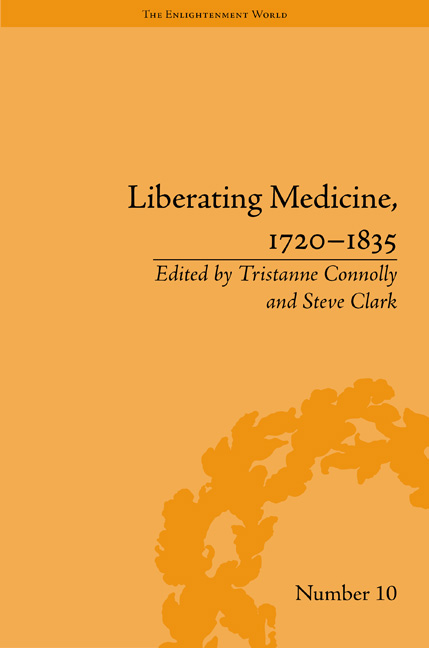Book contents
- Frontmatter
- CONTENTS
- Acknowledgements
- Contributors
- List of Figures
- Introduction
- I Spiritual Sickness and Hypochondria
- II Health and Emancipation
- 4 Due Preparations: Defoe, Dr. Mead, and the Threat of Plague
- 5 An Organic Body Politic: Wollstonecraft's Historical and Moral view of the Origin and Progress of the French Revolution and John Brown's Idea of Health
- 6 Blake, Liberation and Medicine
- 7 Untying the Web of Urizen: William Blake, Nervous Medicine, and the Culture of Feeling
- III Madness
- IV Anatomized and Aestheticized Bodies
- V Birth
- Notes
- Works Cited
- Index
5 - An Organic Body Politic: Wollstonecraft's Historical and Moral view of the Origin and Progress of the French Revolution and John Brown's Idea of Health
from II - Health and Emancipation
- Frontmatter
- CONTENTS
- Acknowledgements
- Contributors
- List of Figures
- Introduction
- I Spiritual Sickness and Hypochondria
- II Health and Emancipation
- 4 Due Preparations: Defoe, Dr. Mead, and the Threat of Plague
- 5 An Organic Body Politic: Wollstonecraft's Historical and Moral view of the Origin and Progress of the French Revolution and John Brown's Idea of Health
- 6 Blake, Liberation and Medicine
- 7 Untying the Web of Urizen: William Blake, Nervous Medicine, and the Culture of Feeling
- III Madness
- IV Anatomized and Aestheticized Bodies
- V Birth
- Notes
- Works Cited
- Index
Summary
Mary Wollstonecraft castigates women's delicate and often contingent sensibility. In the political debate in the 1790s, this image of the female body was transposed into the volatile ‘body’ of the radical movement during the French Revolution. In the political writings of Edmund Burke and Wollstonecraft, there is a conjunction of metaphors; organic body, political body (body-politic) and diseased body. When Wollstonecraft's publisher, Joseph Johnson, published the famous Elements of Medicine (1788) by a physician, John Brown (1735–1788), she must have been greatly influenced by his account of disorders based on the study of the whole nervous system. According to Brown's theory, or Brunonianism, the bodily frame could be deprived of its vital powers by excessive stimuli of both external and internal forces or lack thereof. Brown draws on established medical writings by William Cullen (1710–1790) and Robert Whytt (1714–1768) who said that the nerves are endued with ‘sympathetic’ feelings. Although Brown has been criticized for plagiarizing Cullen's ideas, his ‘simplicity of … views’ and his belief in promoting the self-help system of therapy may have appealed to the radical reader at the time when the public attitude towards the principle of individualism was becoming much more welcoming. Brown regards life as ‘solely the effect of stimulus; which produces disease in proportion to its excess or defect’. He believed that by managing the amount of stimuli, the physician (or even the patient) can improve health, for the environment and internal circulation shape and condition the activities of the organism.
Nerve theory which stresses the ‘sympathetic’ interaction of the matter (including the body) and nervous sensorium emphasizes the functional integrity of the organism, leaving aside the influence of the mind or ‘soul’. The degree to which this organic theory influenced the political debate on the French Revolution is considerable. In Burke's Reflections on the Revolution in France (1790), the holistic image of feudal society is, for example, compared to the ‘whole original fabric’. The image of bodily passions, for example, is applied to represent the unruly mob and their cannibal appetites.
- Type
- Chapter
- Information
- Liberating Medicine, 1720–1835 , pp. 69 - 82Publisher: Pickering & ChattoFirst published in: 2014



